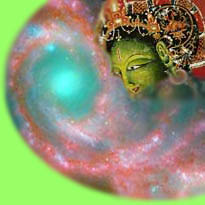|
The Short Commentary on the Tantra of Twenty-one Homages to Tārā called “The Treasure Vase of by Thupten Shedrub Gyatso. |
The Dark Red Great Terrifying Lady |
|||||||||||||||||||||
|
6
|
namaḥ śakrānala-brahma-marud-viśvêśvarârcite | bhūta-vetāla-gandharva-gaṇa-yakṣa-puras-kṛte || namaḥ (n/V) – adoration, homage; śakra – strong, powerful, mighty (Indra); anala (m) – fire, the god of fire (Agni); brahma – Brahmā; marut – the god of the wind (Vāyudeva) – viśva all (here Viśvakarman) –Īśvara – Īśvara; arcite (V) – honoured, worshipped; bhūta (n) – a living being; vetāla (m) – demon, ghost, spirit, vampire; gandharva (m) – celestial musicians or singers; gaṇa (m) – troops or classes of inferior deities; yakṣa (n) – a living supernatural being , spiritual apparition , ghost , spirit, beings of a benevolent and inoffensive disposition; puras-kṛte (V) – honoured, esteemed, attended. Homage to you, who is worshipped by Indra, Agni, Brahma, Vāyudeva, Viśvakarman and Īśvara, And praised in your presence, By a host of spirits, zombies, gandharvas and yakṣas. The sixth homage is to Jigyed Chenmo,Tib the dark red “Great Terrifying Lady”, who holds a phurba1 sparkling with HŪṂ syllables that destroy all evils. Indra, the king of gods; Agni, the sage; Brahma, the creator; Vāyudeva, the wind god; the great Īśvara and all the great ones of the world, and the main guardians of the directions worship her. In front of her kneel a host of evil spirits who harm beings by their misguidance. There are spirits who cause insanity and memory loss, and spirits who turn corpses into zombies. There are gandharvas2 of the bardo and the realm of Yama; yakṣas like Semo, who deceive by seducing; king spirits who makes beings crazy and angry; and piśāca demons that eat flesh. All these evildoers await her orders with humility and respect. Homage is paid to Tārā who crushes the heads of those difficult to tame, and makes them faint into the state of dharmadhātu. The inner meaning of this is that Indra and the other gods are the personification of five elements3, and the spirits are the personification of the five aggregates4. Their reverence symbolizes the purity of the elements and aggregates, which are the base of the male and female Buddhas5. 1 phur pa phurba (kilāya skt) ~ A ritual dagger, usually having three sides, used in wrathful diety practices. 2 gandharva skt ~ A smell eater, a category of beings who sustain themselves on smell like the odor of the smoke of burnt eatables. 3 five elements ~ Earth, water, fire, air, and space. 4 five aggregates (pañcaskandha skt) ~ The components of the psychophysical personality, on the basis of which beings commonly impute the false notion of self. They five aggregates are form, feeling, perception, compositional factors and consciousness. 5 Buddha skt ~ One who has perfected compassion and wisdom though following the bodhisattva path. Characterized by the development of omniscience, and actualization of the three bodies: complete enjoyment body, truth body and emanation bodies |
|||||||||||||||||||||
|
|

